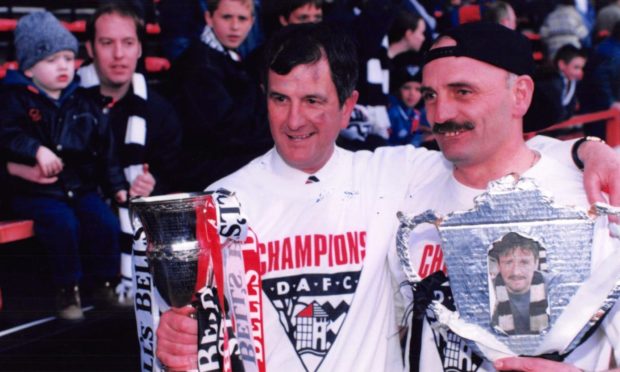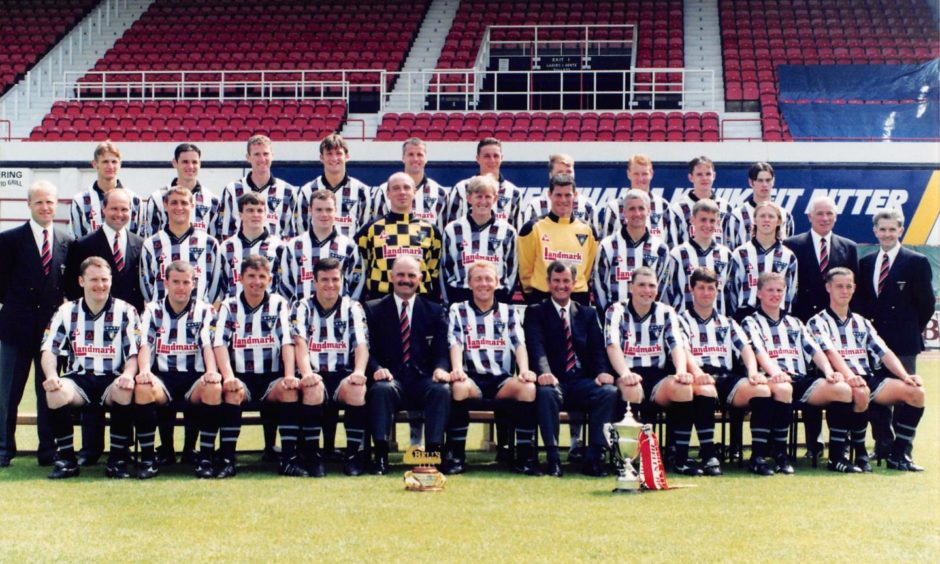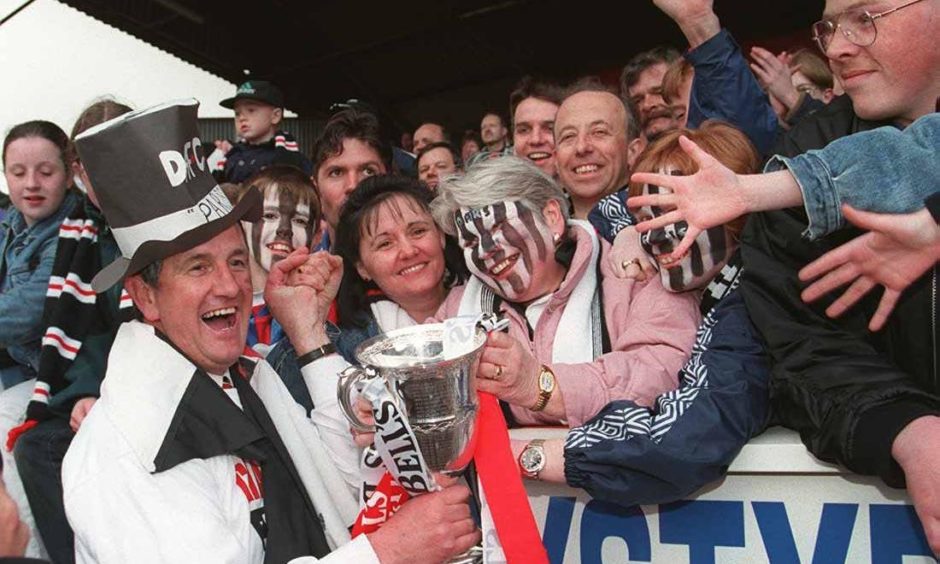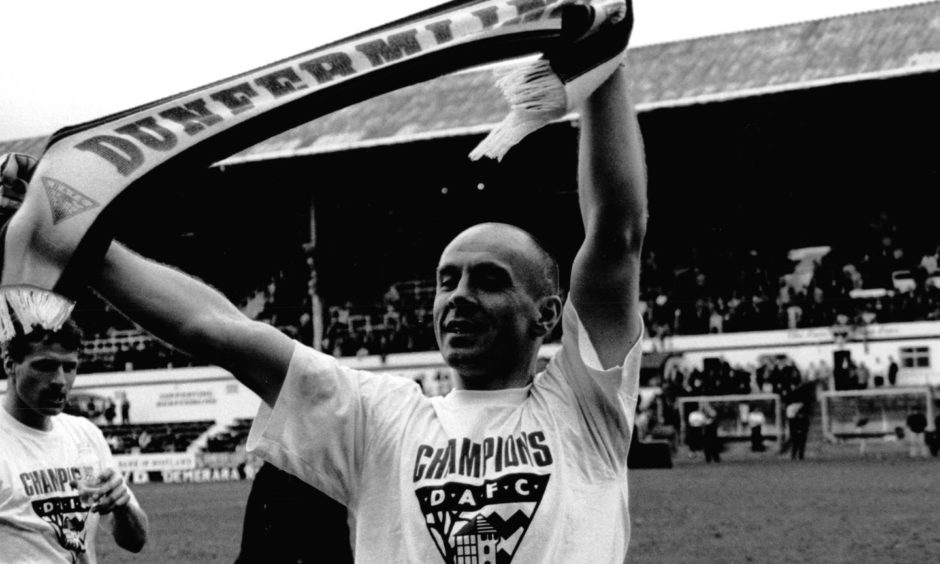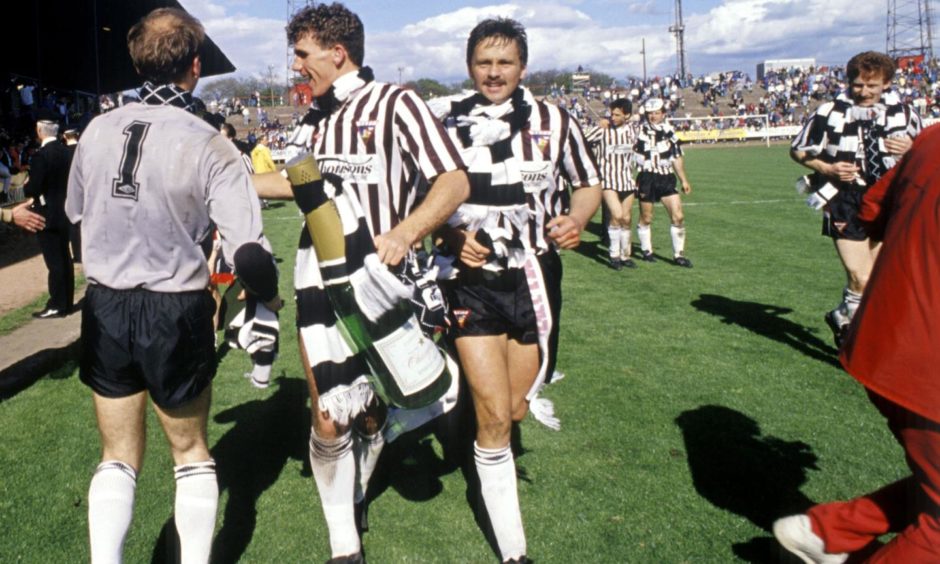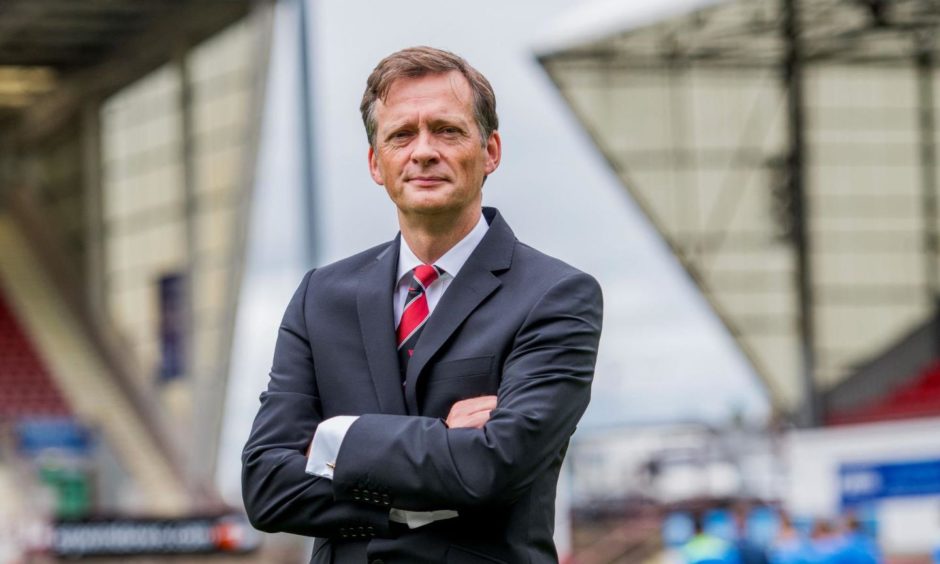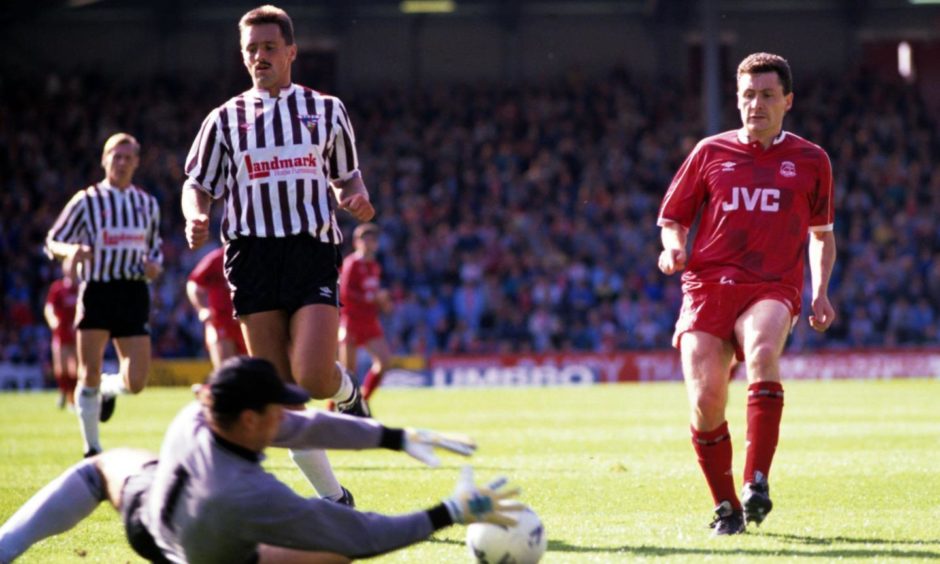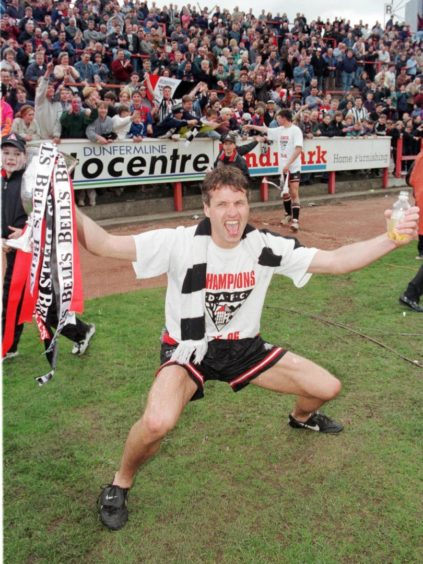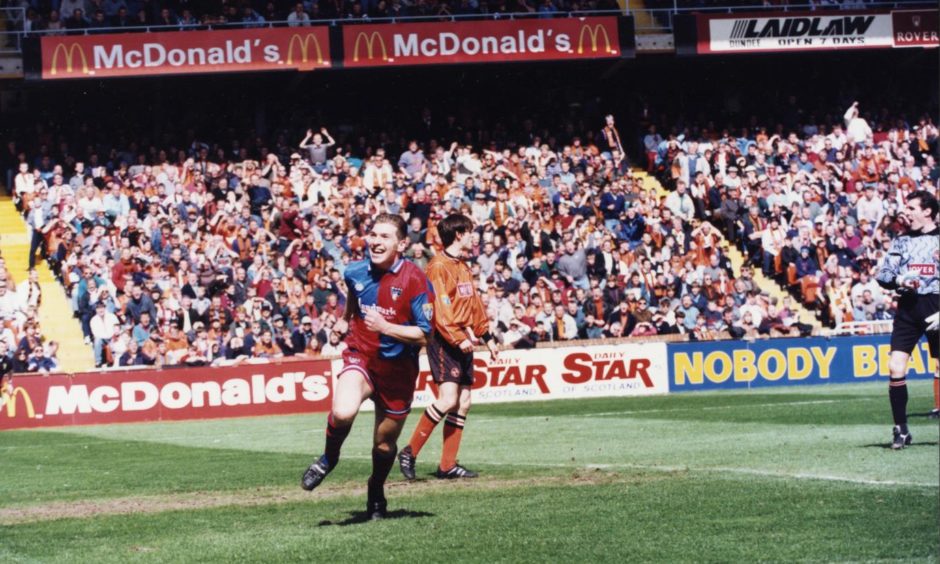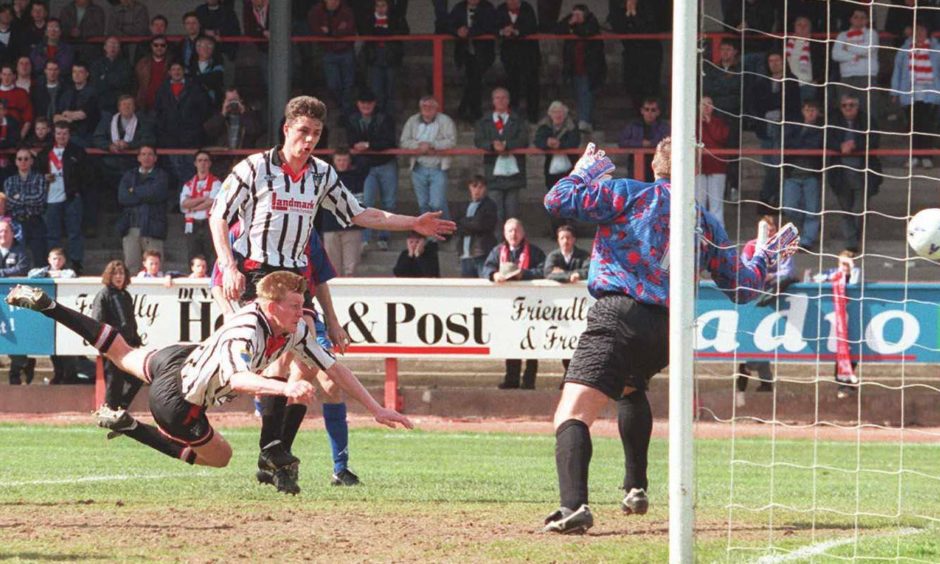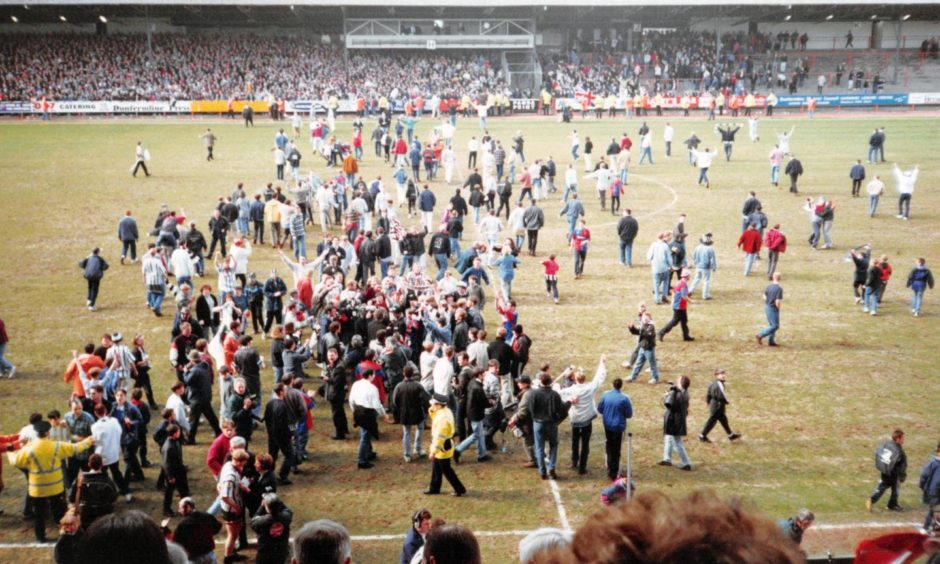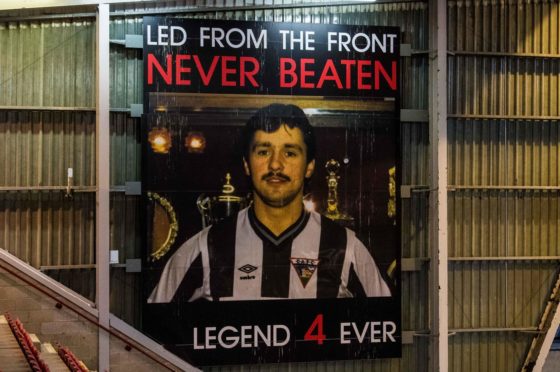When Dunfermline Athletic prevailed in the race for the 1995/96 First Division title, it represented a cathartic triumph in the face of unimaginable tragedy.
Tuesday marks exactly 25 years since that trophy was held aloft on an unforgettable, sun-kissed afternoon at East End Park.
Just 117 days prior, their legendary captain, Norrie McCathie, died in a devastating accident in his home.
‘Do it for Norrie’ was the mantra during the conclusion to that campaign as a football club and community, united in grief, somehow persisted despite the loss of an icon; a man who pulled on the Dunfermline jersey 576 times.
This is a story of trauma, mourning, togetherness and victory, told by those who experienced it, from the pitch to the dugout to the stands.
‘We couldn’t afford cheese’
Dunfermline were never supposed to win promotion in 1996.
They were the pretenders. Sure, they would give opponents a bloody nose, challenge towards the top end of the table and be involved in some seven-goal thrillers along the way.
But they wouldn’t get the job done. They would, at best, fall at the final hurdle just like the previous three campaigns in which they failed to win promotion on the final day. With the calibre of opponents in the division, what chance did they really have?
Dick Campbell, assistant manager to Bert Paton, was still working part-time with glazers CR Smith — and the Premier League was a glass ceiling the Pars were struggling to smash.
“Dundee United; St Mirren; St Johnstone; Dundee; Morton — the standard of that league was incredible and no-one gave us a prayer,” said Campbell. “Whereas, we had to stop giving the players toast and cheese for lunch because we couldn’t afford the cheese!
“Our philosophy was: identify good players who were underachieving,” continued Campbell.
“They’d come to Dunfermline and wouldn’t get big money, but we’d work hard and give them a chance.
“We made the best of what we had — and I think we created a team the town could be proud of.
“We got Ivo Den Bieman on a free transfer, we paid £3,000 for Toddy (Andy Tod). Wee Derek Fleming was £30,000, Allan Moore was a player swap. Marc Millar; Dan (Jason) Dair. You name them, we barely paid a penny for them.
“When Bert did pay some money — £70,000 for Andy Smith — he broke his leg on the first day!”
Evidently, no-one informed the players about their status as occasionally-thrilling also-rans.
Six wins from their opening seven league games laid the foundations for a title push, with early victories over St Johnstone, Dundee United and St Mirren underlining that that Pars were genuine contenders.
They held firm through the festive period, albeit results became more inconsistent.
“We didn’t have any superstars,” said talented midfielder Marc Millar, an inspired signing from Brechin City in 1994.
“Bert and Dick bought wisely and took over a team with experience. It was a close-knit dressing room and the likes of Frenchy (Hamish French), Craig Robertson and Ian Westwater helping to drive things.”
Legendary Dunfermline goalkeeper Ian Westwater added: “As long as we scored more goals than the opposition, that’s all Dick and Bert were interested in — and it showed with the ‘goals against’ column that season.”
“I know Jim (Leishman) brought the club off its knees but my favourite time ever as a Dunfermline fan was Bert and Dick’s time in charge,” said Ross McArthur, the current Pars chairman and a regular, home and away, that season.
“There was just such an honesty about the players and the team gave absolutely everything. It was really good, exciting football.”
‘There was a shock, disbelief’
Then the news broke. Football, in the blink of an eye, was rendered a petty irrelevance.
Some heard it over the phone; some heard it from their teammates; some heard it on the radio.
Norrie McCathie and girlfriend Amanda Burns had died in his home overnight. It was January 8, 1996. They were 34 and 26 years of age, respectively.
“Norrie was always late for training,” said Campbell. “We used to blow the horn at 10am for the bus leaving.
“I’d always just say to Norrie: ‘If you’re late, just shut up, get your kit on and come down to training yourself’.
“I understood the pub game — we both ran pubs — and he had to settle up with his staff in the morning and all that.
“But this particular day, time passed and I got a phone call from a friend saying: ‘Norrie’s not been in. He hasn’t paid the staff. I’m worried about him’.
“I thought it was strange but went to take training — then I came back in a 12:45 p.m. and was told that he had been found dead.”
“It was shock, disbelief. There was an unwillingness to accept what you just heard,” said Millar.
“Norrie wasn’t just a player, he was the captain, a mainstay of the team and a club legend. He was at the forefront of everything in the dressing room; a players’ player.
“When I heard the news, I sat down for about two hours and just didn’t move. I was completely numb for a while.
Legends Never Die
Norrie McCathie
23 March 1961 – 8 January 1996 pic.twitter.com/QFnwC9nje9— Dunfermline Athletic (@officialdafc) January 8, 2020
“No-one can prepare you for that. A club can’t prepare for that; a board, manager, players can’t prepare for that. All you can try to do is do what’s right in the aftermath by coming together.”
“It was a tragedy and the club did incredibly well to come through it,” said Westwater.
“Norrie was a good friend of mine. When I joined the club back in 1985, he was already here and we had some wonderful experiences coming through the leagues. He was a fantastic guy, a great footballer and is so sadly missed.
“He absolutely led by example on the the field. He was hard as nails; not dirty, but proper old fashioned grit and determination. He could also chip in with a few goals.
“It was such a big void to fill in every way.”
McArthur added: “I might be chairman now, but I’m just a supporter at heart, and Norrie McCathie was my hero.
“I still remember the day we lost him. I turned on the radio and, because I had just woken up, I thought ‘surely I didn’t just hear that?’
“It was horrendous and impossible to process. The outpouring of grief was all-encompassing.”
‘When do we play again? Can we play again?’
Players and coaches alike struggle to articulate how the Dunfermline dressing room managed to recover from the devastating loss of their skipper, let alone step back onto a football pitch just five days later against Clydebank.
Campbell cites the ‘camaraderie’ fostered within a squad with no egos and then branches off into three anecdotes in quick succession; scattergun storytelling.
One is about Ivo den Bieman leaping on stage to give an impromptu speech at a supporters’ dinner despite the fact it was Andy Tod receiving an award. ‘The lassies were throwing their knickers at the big handsome git,’ laughs Campbell.
Then there’s the tale of Paton warning him during a pre-season trip that he was worried about the amount of money a young Jackie McNamara was asking for. ‘Watch he’s not gambling or drinking, Dick,’ said Paton. It turned out the future Scotland international was spending a fortune on the nearby go-karts.
Or the one about keepers Westwater and Guido van de Kamp complaining about a coach — who shall remain nameless — urinating (Campbell uses a different word) in their goal-mouth before training.
However, all the tales speak to a connection between the players, management and supporters which was vital as the club found a way to carry on the season.
“You had to go through the process of the funeral and the media frenzy that came about,” recalled Millar.
“And you had the questions hanging over you: when do we start playing again? Can we start playing again? We did it together.”
“Craig Robertson took the captain’s armband and led the club on-field and off-field,” added Westwater.
“He was a different type of person; not the most demonstrative of people, but a hugely important figure and — in my view— a very underrated player.”
Not only did Dunfermline continue to play, they only lost one of their next 14 First Division fixtures.
‘Trophy already had orange and black and ribbons on it’
Despite the Herculean effort of Dunfermline’s players — emotionally and physically — they approached the penultimate fixture of the campaign as rank outsiders.
Dundee United were a point ahead of the Pars and would claim the title with victory at Tannadice.
More than 12,000 fans were in attendance to see Maurice Malpas, Dave Bowman, Craig Brewster and a swathe of other top talents breeze to promotion.
United had beaten the Pars 4-0 in the Challenge Cup semi-final, knocked them out of the Scottish Cup and won 3-1 when the Fifers previously visited Tannadice on league duty.
“The First Division trophy was at Tannadice — and it already had orange and black ribbons on it,” recalled McArthur.
“It was a foregone conclusion, according to pretty much everyone.
“We just thought ‘fine, the world’s against us — so let’s show them’. United limited our numbers to 2,000 and tried to cram us into a wee stand, but the fans absolutely took the roof off the place. That was the spirit of Norrie; pure defiance.”
“I still remember the article in that morning’s paper: ‘7-1,’ it said,” continued Campbell.
“They had done a poll among the managers in the league asking who would win at Tannadice and seven said United.
“The only one who didn’t was Jimmy Bone at St Mirren — it helps that I was Jimmy’s best man at his wedding!”
Stewart Petrie had other ideas when he took advantage of miscommunication between Grant Johnson and Ally Maxwell to latch on to an Allan Moore flick-on and give Dunfermline a lead.
Despite the goalscorer’s red card after 65 minutes, the visitors held firm. “Ian Westwater was absolutely magnificent that day. Magnificent,” recalled Campbell.
“We had been losing a few goals,” added Westwater. “It wasn’t like we got shut-out after shut-out — but that was a vital one!”
Campbell added: “I’ll always remember the trip back down the motorway from Dundee. What an absolute riot.
“Horns blasting, flags and scarves hanging out the windows. What a sight, and what a massive moment in Dunfermline’s history.”
‘It felt like more than 13,000’
That remarkable triumph in Tayside meant Dunfermline would be champions with a win over Airdrieonians at East End Park on May 4.
Dundee United and Morton played each other at Cappielow and, should the Pars fail to win, then the victors of that game would claim the title with a victory.
The trophy was at an airfield, waiting to be flown to the winners in a helicopter. It did not have orange and black ribbons on it.
Kick-off on the Halbeath Road was delayed by 15 minutes as the crowd swelled to 13,123.
Highlights of the game begin with commentator Jock Brown comparing the atmosphere to the halcyon days of Dunfermline’s European adventures in the 1960s.
“I’m old enough to remember those glory days,” laughed Campbell. “But, even with that in mind, it was a special afternoon.”
Westwater added: “It actually felt like more than 13,000 fans because the stadium was completely rammed on the old terracing. There was an expectation that we would win but, at the same time, a trepidation that we wouldn’t win.”
When referee Mike McCurry did finally get the game under way, towering striker Andy Smith — leg now thankfully intact — settled nerves with the opener.
“That went down like a U-boat with the Airdrie fans,” joked Westwater, with Smith being an ex-Diamond.
“However, Peter Hetherston levelled after taking advantage of a den Bieman slip. Nails were being munched down to the quick.
“There was no love lost between us and the Airdrie fans, I can tell you that,” said McArthur. “So, they weren’t turning up to do us a favour.”
But the moment of relief came when Moore was felled for a penalty-kick in the second half. Millar, as cool as you like, stepped up and sent Andy Rhodes the wrong way. That swing of his cultured right foot secured those prized three points.
“I remember wee Moorey getting pulled down for the penalty and everyone is looking at the Airdrie keeper (Rhodes) — a good ex-Dunfermline man,” smiled Campbell.
Millar has heard that old chestnut. “For 25 years, I’ve listened to folk say: ‘It was Andy Rhodes — he dived out of the way’. I’ll tell you this: Andy wasn’t saving that penalty, even if he did go the right way.
“I was always confident from the spot and, put it this way, there wasn’t a queue of others ready to take it!
“I don’t think I thought about the enormity of that kick at the time. You can’t. Then, afterwards, you can think about that moment and what it meant to the fans.”
As it happened, a draw would have been enough. Dundee United, who would go on to win promotion via the playoffs, had drawn with Morton, and due to the delayed start to proceedings at East End Park, the players knew it.
“There was a moment — I think we had just made a couple of substitutions — and the place just erupted,” said Millar. “The score was in from Cappielow. We knew we’d done it.”
“It was party central for that last 13 minutes but we still had a job to do,” adds Westwater.
“The last thing we wanted was to go up with a whimper and we knew how important that day was for everyone.”
McCarthur recalled: “I still remember the sound of the helicopter whirring over East End Park, which was a sweet sound.”
‘Norrie was looking down on us’
“The celebrations were tempered — a wee bit of sadness through it all — because Norrie wasn’t there with us to celebrate. But his spirit certainly drove us on and got us through a few games; 100 per cent,” said Westwater.
“That title win was the greatest achievement of any Dunfermline team in modern history and one of my proudest days in football,” adds Campbell.
“I’ve no doubt Norrie was looking down on us.”
The players danced and celebrated in front of the North Stand, which would later be renamed the Norrie McCathie Stand by chairman Roy Woodrow.
“You wonder if you will ever see the type of character again in the modern game — the loyalty, the lack of ego, the connection with the fans — because the game is just so different today,” added McArthur.
“I think it’s special that he’s up there, looking down on the players who follow him and hopefully giving them a wee bit of inspiration.”
